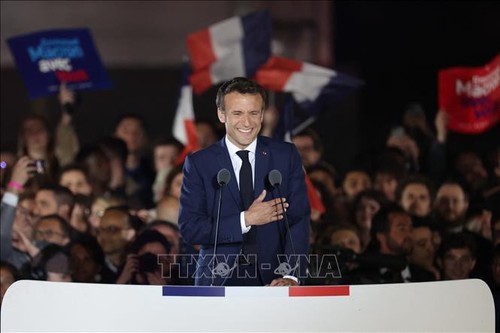 Emmanuel Macron is reelected French President. (Photo: AFP/VNA) Emmanuel Macron is reelected French President. (Photo: AFP/VNA) |
The French Interior Ministry announced that centrist Emmanuel Macron of the Republic on the Move Party received 58.55% of the vote in the last round of the presidential election on April 24th. His rival, far-right candidate Marie Le Pen, won 41.45% of the vote.
Connecting people
Observers say that Macron’s second term will not be easy. He must endeavor to unite a divided France, in particular reaching out to the majority of far right voters. This fact was mentioned by Le Pen after the election. She called Macron's 58.55% votes a victory for the opposition because the number of votes in favor of the incumbent President had dropped sharply.
Macron said in his victory speech on Sunday night that it was his responsibility to find a response to the anger of those French voters who backed the far-right, or who didn't vote at all. He said he is the president of all.
If he can successfully work with the majority of the right wing, it will give him an advantage in handling other challenges, including the possible opposition to his reform plans, particularly pension reform and the gradual increase of minimum retirement age from 62 to 65. Analysts say Macron would confront social discontentment in implementing such sensitive policy as pension. Voters, who oppose pension reforms, have requested him to adopt a retirement age of 64, otherwise they will hold protests.
Another challenge is an energy price hike. The Macron administration has set out plans to cap rising energy bills and has pledged to reduce prices after the election. During the election campaign he confirmed this but did not set a timeline.
When campaigning in Marseille, President Macron vowed to rebuild the climate policy that France has been pursuing. But environmental campaigners questioned Macron's goals when both he and Mrs. Le Pen did not mention environmental issues during a televised debate before the second round of the election. France will hold a parliamentary election in June. The 2017 parliamentary election was favorable for Macron, but this time the results are difficult to forecast.
Analyzing Macron's vote totals, observers found that the result also came from votes against the far-right candidate. The intention was only to prevent Le Pen from winning. The French political scene is divided into 3 blocs: pro-EU Macron, Le Pen’s nationalists, and Melenchon’s leftists. Each bloc has the support of more or less one third of the voters, so a government is unlikely to run smoothly with two thirds opposition. Speaking to supporters in Paris after being defeated, Le Pen said she will never abandon France and she has prepared for the fight in the parliamentary election.
 Emmanuel Macron (Photo: AFP/ VNA) Emmanuel Macron (Photo: AFP/ VNA) |
Challenges to confirm France’s position in the EU
Macron has always focused on the EU since he took office in 2017. He wants to change visa policy between EU countries, create a common tariff rate within the bloc, develop technology, and increase defense capacity. This goal of an "enthusiastic and strategic" Europe is seen as ambitious but will face many challenges within the EU.
The biggest challenge at present for Macron is the armed conflict in Ukraine, which has upset the EU’s security structure, the geo-political order, and political and economic strategies. Before the conflict, Macron and the leaders of the European Commission planned to hold the first EU Defense Summit in March 2022 in Paris, aiming to turn the EU into a security alliance, taking a big step toward the goal of strategic autonomy.
However, at the summit in Versailles on March 11, the leaders discussed the sole topic of the Ukraine crisis and the EU’s response. NATO’s role has been revived and EU countries have stopped talking about building their own defense force. As the main advocate of the EU’s strategic autonomy, President Macron will find it difficult to revive these projects while the Ukraine conflict is still raging.